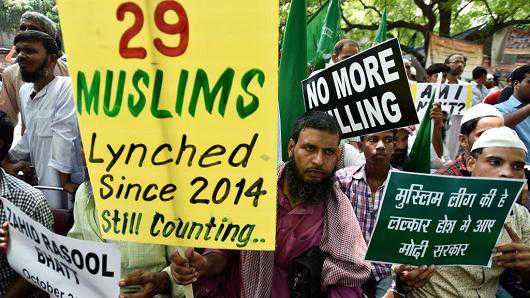Asia became less democratic in 2017
31 January, 2018

Burhaan Kinu / Hindustan Times / Getty Images
July 2017: Protesters in New Delhi take part in a sit-in over a spate of assaults against Muslims and low-caste Dalits by Hindu vigilantes.
Asia ended 2017 less free than it began it.
The Economist Intelligence Unit's annual assessment of freedoms across 167 countries said Asia-Pacific had "experienced the biggest decline of any of our seven regions in 2017" after climbing up the rankings in recent years.
In the research firm's report released Wednesday, Asia scored 5.63 — lagging behind North America (8.56), Western Europe (8.38) and Latin America (6.26).
Every year, the analysis company judges countries on five categories: electoral process and pluralism; civil liberties; the functioning of government; political participation; and political culture. Nations are then classified under four types of governments: full democracy, flawed democracy, hybrid regime and authoritarian regime.
Within the region, only Australia and New Zealand classified as full democracies last year, the report found.
Meanwhile, "Asia's two largest emerging democracies, India and Indonesia, suffered significant declines in their scores," the EIU said, citing a rise in "conservative religious ideologies."
India dropped from the 32nd position in 2016 to the 42nd, while Indonesia slid from 48th to 68th place.
Last year's gubernatorial election in Indonesia's capital city, which resulted in the arrest of incumbent governor Basuki Tjahaja Purnama over alleged blasphemy, was a big hit to civil liberties in Southeast Asia's largest economy, the report said. "Indonesia's stringent blasphemy law has often been used to limit freedom of expression."
India, meanwhile, has experienced a series of mob attacks on marginalized groups, particularly Muslims and lower-caste individuals known as Dalits, throughout 2017.
"The strengthening of right-wing Hindu forces in an otherwise secular country led to a rise of vigilantism and violence against minority communities as well as other dissenting voices," the EIU said.
The firm also noted that Myanmar, Cambodia and Vietnam "sank deeper into authoritarianism" in 2017 compared to the prior year.
The state of media freedom was also a focus in the report. The EIU noted that China, North Korea and Laos "are black holes for independent news and information."
TAG(s):
